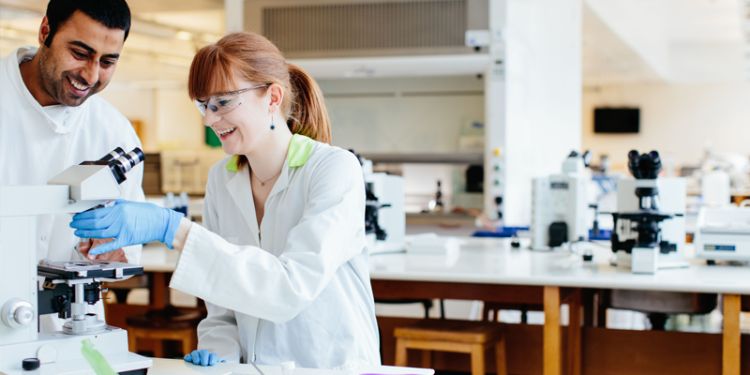Subject pathways within the Natural Sciences degree (2025/26)
Biochemistry

Many devastating diseases, such as cancer, are caused by just a few atoms being out of place inside your cells. Biochemistry aims to understand how living things work at the atomic level. This knowledge drives the most exciting developments in biomedical research, from the development of new drugs to treat neurodegenerative disorders to cancer therapies and coronavirus vaccines.
Biochemistry is an interdisciplinary subject at the boundary between biology and the physical sciences. This will make you highly sought after by a wide range of top employers, both within the biological/biomedical research sector and beyond.
If you decide to take the Biochemistry subject pathway as part of your Natural Sciences degree, you'll take a series of optional and compulsory modules within this pathway.
Please note: The modules listed below are indicative of typical options and some of these options may not be available, depending on other modules you have selected already.
Year 1
Compulsory modules
The Molecules of Life – 10 credits
You’ll gain an understanding of the molecular biology of the cell. Starting from simple chemical principlies, you will learn about the relationship between structure and function in the cell and the molecular basis for cellular function.
Genes to Proteins – 20 credits
This module will provide you with an introduction to modern chemistry with an initial focus on a qualitative appreciation of electronic structure and how it determines the chemical and structural properties of molecules. You will learn about organic molecules, functional groups and reaction mechanisms.
Year 2
Compulsory modules
Biochemistry 1 – 20 credits
Module description coming soon
Biochemistry for Natural Scientists – 20 credits
Module description coming soon
Optional modules
Introduction to Drug Design – 10 credits
Discover the principle modes of binding of small drug molecules to biological macromolecules and learn how to identify key recognition features in drug molecules.
Medical Immunology – 10 credits
You’ll gain detailed knowledge of the immune system, focusing on human health, from infectious and auto-immune diseases to treatment.
Chemotherapy – 10 credits
The basis of chemotherapy is selective toxicity, the use of agents to kill or suppress the growth of invading cells or infective organisms. This module will help you understand how these agents work. You will learn about the drugs used to treat cancer, bacterial, fungal and viral infections.
Cell Biology of Disease – 10 credits
Develop a broad understanding of the eukaryotic cell and how it responds to and is altered in infectious and non-infectious diseases. Emphasis is placed on a comprehensive grounding of cellular function by considering different cell types and associated disease states.
Year 3
Optional modules
Advanced Topics in Molecular and Cellular Biology – 20 credits
This is one of our flagship research-led modules in which you’ll become familiar with current research in a range of topics which have previously covered: within the field of molecular bioscience.
- DNA damage
- Stem cells
- Synthetic biology
- How to build an organelle
Advanced Topics in Biochemistry and Structural Biology – 20 credits
This is one of our flagship research-led modules in which you’ll become familiar with current research in a range of topics which have previously covered:
- Enzymes for biofuels
- Protein dynamics
- Natural product biosynthesis
- Protein folding and disease
Advanced Skills in Biochemistry – 20 credits
You’ll be provided with up-to-date developments, hypotheses and controversies in biochemistry. You’ll have an opportunity to extend your problem-solving and scientific communication skills as well as participate in career workshops.
Advanced Topics in Microbiology 2 – 20 credits
This is one of our flagship research-led modules in which you’ll become familiar with current research in a range of topics which have previously covered:
- Respiratory infections
- Antibiotic action and resistance
- Respiratory infections
- Human-microbe interactions
- Streptomyces, the Antibiotic Makers
Cancer Biology – 20 credits
Explore a range of human cancers, from the molecular basis of cancer to the alterations in cells and tissues in cancers to current therapies.
Year 4 (MNatSci, BSc)
Optional modules
High-Throughput Technologies – 15 credits
Learn the principles of high-throughput biomolecular data generation and will provide an introduction to data analysis.
Advanced Immunology – 15 credits
Discover the essential principles of the immune system. These include Innate Immunity and Adaptive Immunity, which are central to understanding the host's interaction with an environment containing a wide range of potentially pathogenic microorganisms.
Advanced Biomolecular Technologies – 15 credits
Learn about a range of techniques and technologies which are applicable to modern biosciences. Exercises will develop data analysis and problem-solving skills and expose you to current research trends in the biosciences and to leading researchers in the field.
Medical Diagnostics – 15 credits
You’ll gain a comprehensive understanding of current molecular tests to diagnose major areas of infectious and non-infectious diseases.
Treatment of Infectious Disease and Cancer – 15 credits
Explore the treatment of human diseases caused by infectious agents (bacteria, viruses, fungi) and cancer by current and emerging approaches, with a focus on describing the mechanistic rationale for chemotherapy, vaccination, gene/RNA therapy, and immunotherapy.

